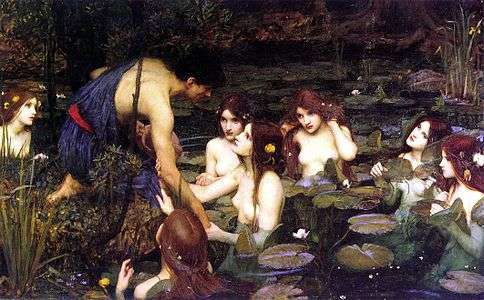Hylas

In classical mythology, Hylas (Greek: Ὕλας') was a youth who served as Heracles' companion and lover[1] (Roman Hercules). His abduction by water nymphs was a theme of ancient art, and has been an enduring subject for Western art in the classical tradition.
Genealogy
.jpg)
In Greek mythology, Hylas was the son of King Theiodamas of the Dryopians. Roman sources such as Ovid state that Hylas' father was Hercules and his mother was the nymph Melite (Metamorphoses, 9.279), or that his mother was the wife of Theiodamas, whose adulterous affair with Heracles caused the war between him and her husband.
After Heracles killed Theiodamas in battle, he took on Hylas as arms bearer and taught him to be a warrior. The poet Theocritus (about 300 BC) wrote about the love between Heracles and Hylas: "We are not the first mortals to see beauty in what is beautiful. No, even Amphitryon's bronze-hearted son, who defeated the savage Nemean lion, loved a boy—charming Hylas, whose hair hung down in curls. And like a father with a dear son he taught him all the things which had made him a mighty man, and famous."[2]
Argonauts
Heracles took Hylas with him on the Argo, making him one of the Argonauts. Hylas was kidnapped by nymphs of the spring of Pegae, (Dryope), that fell in love with him in Mysia and vanished without a trace (Apollonios Rhodios). This upset Heracles greatly, so he along with Polyphemus searched for a great length of time. The ship set sail without them. According to the Latin Argonautica of Valerius Flaccus, he never found Hylas because he had fallen in love with the nymphs and remained "to share their power and their love."
Cultural references

The story of Hylas and the nymphs is alluded to in Book 3 of Edmund Spenser's The Faerie Queene, Canto XII, Stanza 7:
Or that same daintie lad, which was so deare
To great Alcides, that when as he dyde
He wailed womanlike with many a teare,
And every wood, and every valley wyde
He fild with Hylas name; the Nymphes eke "Hylas" cryde.
Hylas is also mentioned in Christopher Marlowe's play Edward II: "Not Hylas was more mourned for of Hercules / Than thou hast been of me since thy exile" (Act I, Scene I, line 142-3), and in Oscar Wilde's The Picture of Dorian Gray, Chapter 11. "...and gilded a boy that he might serve at the feast as Ganymede or Hylas."
"Hylas" is the name of one of the two characters in George Berkeley's Three Dialogues between Hylas and Philonous. He represents the materialist position against which Berkeley (through Philonous) argues. In this context, the name is derived from ὕλη, the classical Greek word for "matter." Stanisław Lem adopted these characters in his 1957 non-fiction, philosophical book, Dialogi (Dialogues).[3]
In the 1963 film, Jason and the Argonauts, Hylas (played by Scottish actor John Cairney) is depicted as an intelligent and witty character who serves a role as the "sidekick" of Hercules. In the film he is not abducted by water nymphs, but instead crushed under the body of the stricken Talos when he foolishly tried to retrieve a goddess' gold brooch pin dropped by Hercules. Hercules then leaves the Argonauts afterwards to search for his friend in vain.
In the third sentence of Eric Linklater's 1929 novel, Poet's Pub, Hylas is mentioned as a character: "The hunted poet Hylas stood up, weak as water because of the rape he had eluded, and vanished before his knees could knock again."
Thomas Azier's debut album is named "Hylas". Its opening track of the same name retells Hylas' encounter with the nymphs.
See also
References
- ↑ perdomo, Leopoldo. "THE MANY LOVES OF HERCULES". Retrieved 23 September 2014.
- ↑ For a perspective from gay literary history, see The World History of Male Love: Greek Mythology, "Hercules and Hylas." See also Pederasty in ancient Greece on the historical social institution.
- ↑ pl:Dialogi#Struktura dzieła
External links
| Wikimedia Commons has media related to Hylas. |
- Berkeley's Three Dialogues between Hylas and Philonous
- Encyclopædia Britannica on Hylas
- Hylas in the Classical Style by Stefanie E. Dittert, Professor Buttigieg
- Encyclopedia of Greek Mythology on Hylas